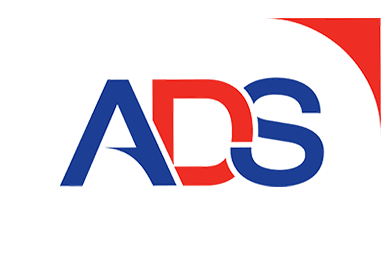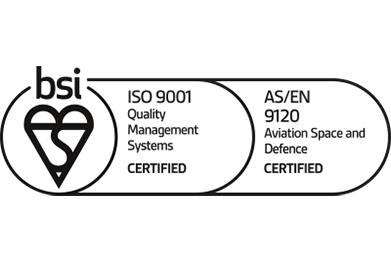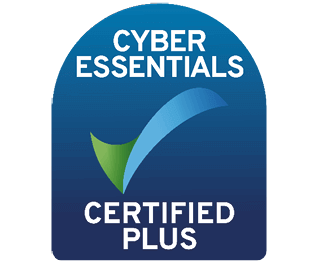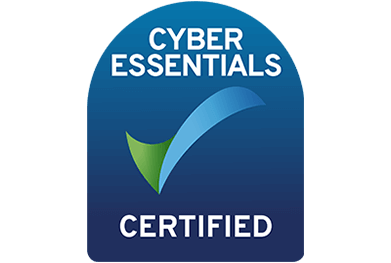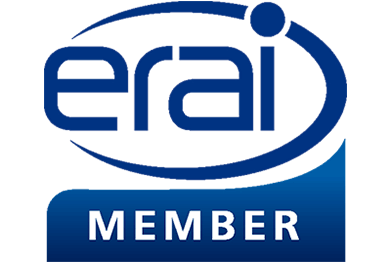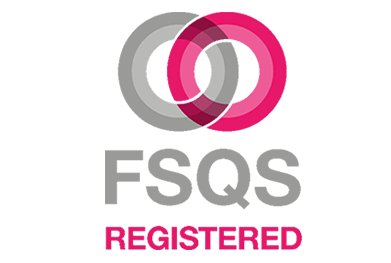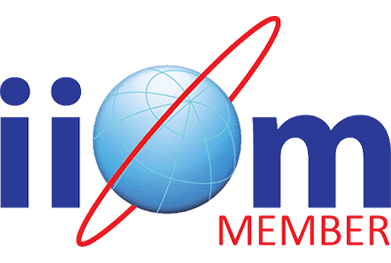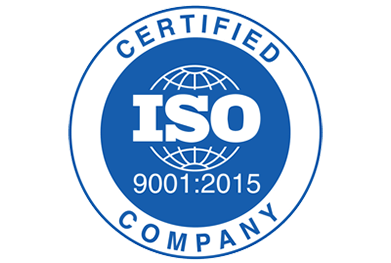What is a SCIF (Secure Compartmented Information Facility)?
Deployable Secure Compartmented Information Facilities for mission-critical systems and shielded, HEMP / IEMI, TEMPEST and RFI applications
APC Technology Group delivers fully accredited Sensitive Compartmented Information Facilities (SCIFs) for government, defence and commercial applications. Projects are managed end-to-end, from sourcing and installation to compliance with UK (MOD, NCSC, TEMPEST, JSP440) and US (ICD 705) standards, through to certification and final sign-off.
The following sections outline the purpose of a SCIF, the types of facilities available and the compliance requirements for developing secure, accredited environments.
What is a SCIF?
A SCIF is a secure, purpose-built environment designed to protect classified or sensitive government information from unauthorised access, interception or data leaks.
SCIFs are used by intelligence agencies, military organisations and government contractors to store, process, or discuss highly classified materials.
This includes measures against:
- Acoustic interception (through soundproofing and noise masking)
- Radio frequency (RF) interception (using RF shielding, Faraday cage construction)
- Physical intrusion (with reinforced walls, intrusion detection, and access control)
In the UK, SCIFs often adhere to the HMG Security Policy Framework (SPF), JSP 440 and other government-issued security standards to ensure the facility is accredited for use.
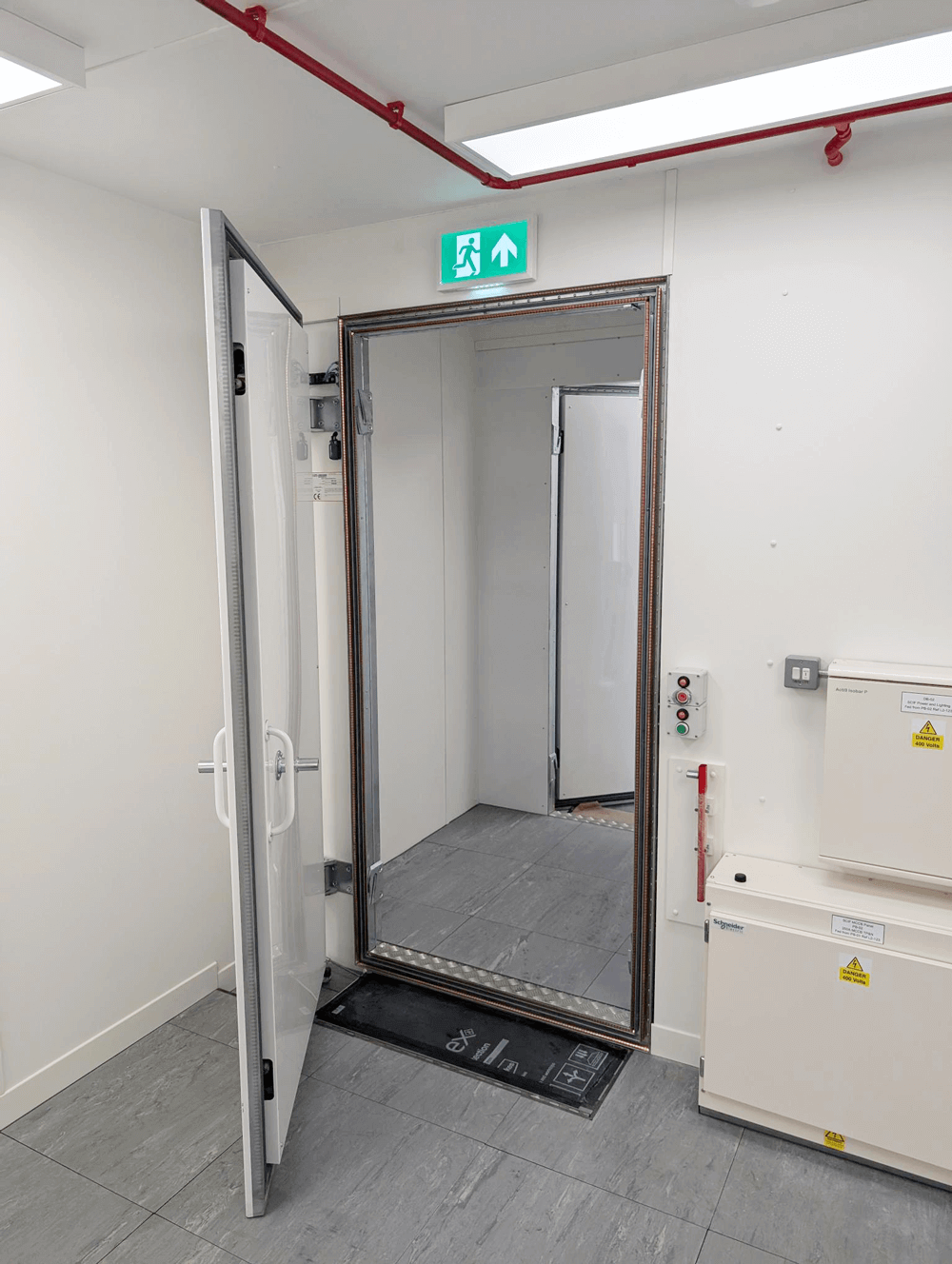

Key Features of a SCIF
Our technical experts address the reliability and robustness of a SCIF across eight key parameters:
Security Parameter |
Overview |
|
Physical Security |
Reinforced construction, secure entry points, and advanced soundproofing protect classified information. These measures meet strict construction standards required for accredited facilities. |
|
Access Control |
Biometric authentication, verified credentials, visitor logs, and restricted entry ensure only cleared personnel can enter. These controls form the backbone of government security requirements. Personal Electronic Devices are typically prohibited. |
|
Electronic Security |
Electromagnetic Security (EMS) / TEMPEST controls and RF attenuation (Faraday enclosure) to mitigate compromising emanations. Prevent electronic eavesdropping and safeguard secure communication lines. |
|
Monitoring & Surveillance |
Continuous CCTV coverage, intrusion detection, and alarm systems provide 24/7 oversight, supporting accreditation and compliance checks. |
|
Document & Data Security |
Encrypted storage, strict access policies, and controlled destruction methods keep classified documents and digital files safe from leaks or unauthorised use. |
|
Operational Security (OPSEC) |
Secure workstations, compartmentalisation, and internal compliance policies ensure tasks align with an individual’s security clearance level. |
|
Environmental Controls |
Fire protection, HVAC stability, and backup systems maintain operational continuity and health and safety within the classified facility. |
|
Emergency Procedures |
Clear evacuation protocols, disaster recovery plans, and backup power systems protect critical operations during crises without compromising security. |
Why are SCIFs Important?
SCIFs play a critical role in national security, enabling classified work such as:
- Intelligence analysis and secure communications
- Military planning and operational coordination
- Handling and storage of classified government documents
- Conducting secure meetings and briefings
Without a classified info containment, organisations cannot legally handle certain types of Sensitive Compartmented Information (SCI), as it would risk unauthorised disclosure.
Who uses SCIFs?
SCIFs are required by government intelligence agencies, the military, defence contractors and commercial industries that handle classified or highly sensitive information. Beyond government and defence, sectors such as finance, pharmaceuticals and technology also rely on SCIFs to protect intellectual property, research data and trade secrets.
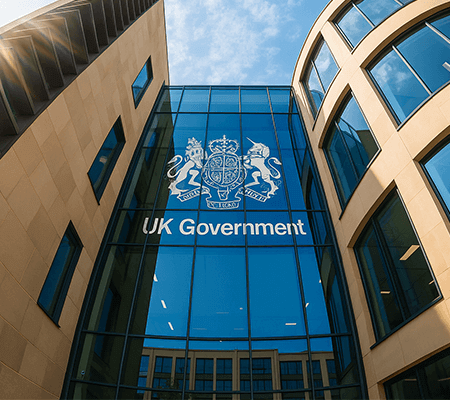

Government & Intelligence
UK intelligence agencies (MI5, MI6, GCHQ,) and government bodies like the Joint Intelligence Committee and National Security Council use SCIFs to process Top Secret intelligence and support national security decision-making.
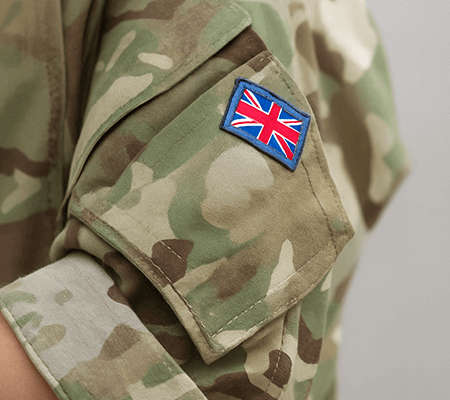

Military & Defence
The armed forces rely on SCIFs for operational planning, secure communications, and intelligence briefings, ensuring classified data stays protected in both peacetime and conflict.
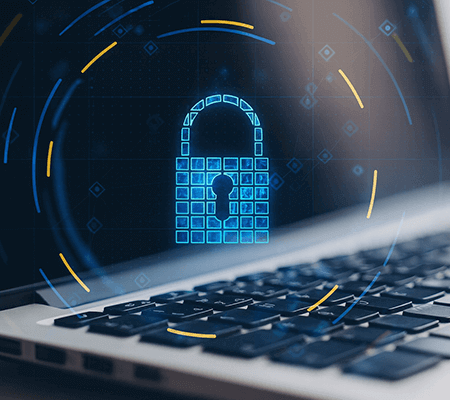

Defence Contractors
Defence, aerospace, and cyber security companies operate SCIFs under standards like ICD 705 (US) and the Government Security Framework (UK) to handle classified projects and maintain compliance with government security requirements.


Commercial & Business
Industries such as finance, pharmaceuticals, and technology use SCIFs to safeguard intellectual property, R&D data and trade secrets, protecting against corporate espionage and insider threats.
Comparing the Different Types of SCIFs
Although all Sensitive Compartmented Information Facilities (SCIFs) must meet strict government security standards, they are not all built the same way.
Three Main Categories of SCIF Facilities
Depending on operational needs, organisations may use the following types:
- Permanent
- Temporary/Modular
- Mobile/Deployable
APC Technology Group provides all three SCIF types: permanent, modular and mobile/deployable through turnkey design, engineering and installation services aligned to UK and US security standards. Their solutions span fixed in‑building rooms, ISO‑compliant containerised units for rapid deployment and field‑ready deployable SCIF containers engineered for HEMP/IEMI and RFI environments. Projects include full M&E fit-out (power, HVAC, finishes), RF shielding/Faraday cage construction and accreditation support ensuring compliant operation.
Permanent SCIF
A permanent SCIF is a fixed, purpose-built secure facility, usually located within a government building, military base or corporate office.
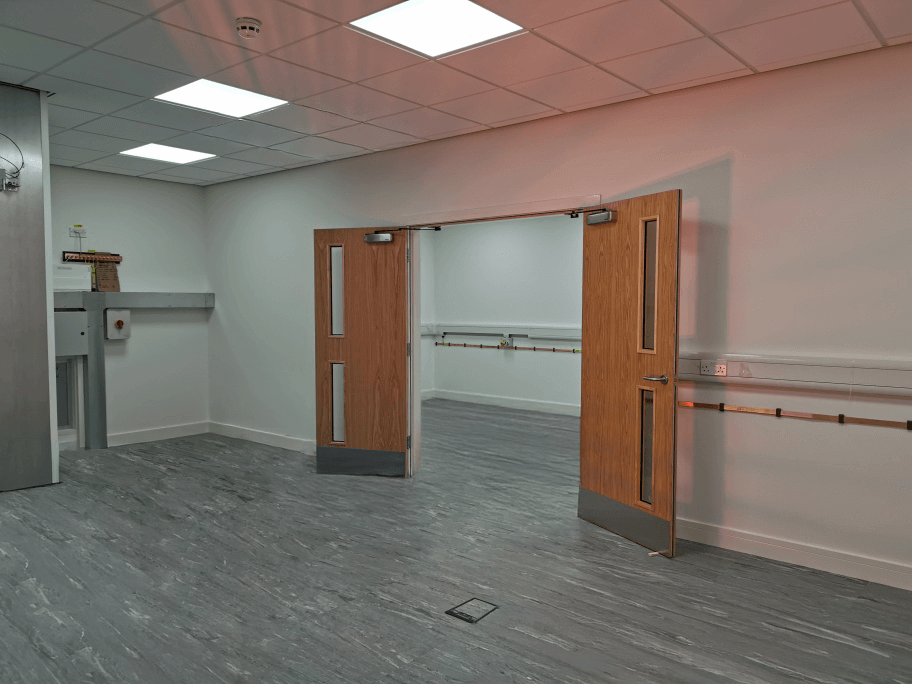

Designed for long-term operations, these facilities are built to the highest government accreditation standards and provide the most durable and robust security for processing Top Secret and compartmented information.
Pros:
- Highest assurance for long‑term operations; easiest to integrate deeply with building security, power, HVAC, and physical/acoustic/RF controls for accreditation such as ICD‑705/TEMPEST pathways.
- Optimised for mission continuity and durability; ideal where persistent Top Secret/SCI handling and frequent classified discussions occur.
Cons:
- Longest delivery timelines and the most onsite construction disruption compared to off‑site prefabrication options.
- Typically highest total cost of ownership and least flexible for relocation once built.
Modular SCIF
Modular SCIFs are pre-fabricated or container-based units that are manufactured off-site and assembled on location. Designed for temporary projects or for defence contractors who need a compliant facility quickly.
Modular SCIFs are faster and more cost-effective to deploy than permanent builds, and because they can be relocated, they offer flexibility while still meeting strict government security requirements.
Pros:
- Rapid delivery and minimal onsite disruption, due to factory build and assembly, accelerate accreditation readiness.
- Relocatable and scalable; ISO‑container form factors enable transport and reconfiguration; can be engineered to MIL‑STD‑188‑125, DEF‑STAN‑59‑188, SDIP‑29 for HEMP/IEMI/RFI resilience.
Cons:
- May face footprint, craning, and site-access constraints; integrating with legacy building systems can add design interfaces.
- Can have space/layout limits versus fully custom fixed facilities; exterior container appearance may require additional camouflage or architectural treatments.
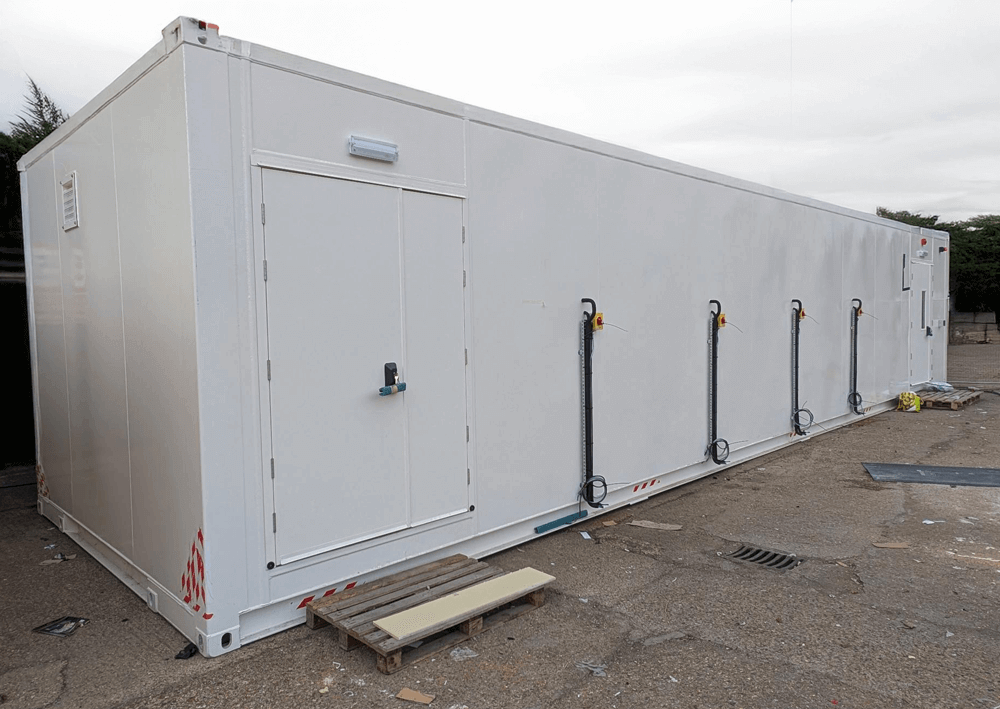

Mobile / Deployable SCIF
A mobile SCIF is a transportable secure environment, often built into vehicles, trailers, or rapidly deployable shelters. These are designed for military and intelligence operations in the field, providing secure communications and operational planning wherever they are needed.
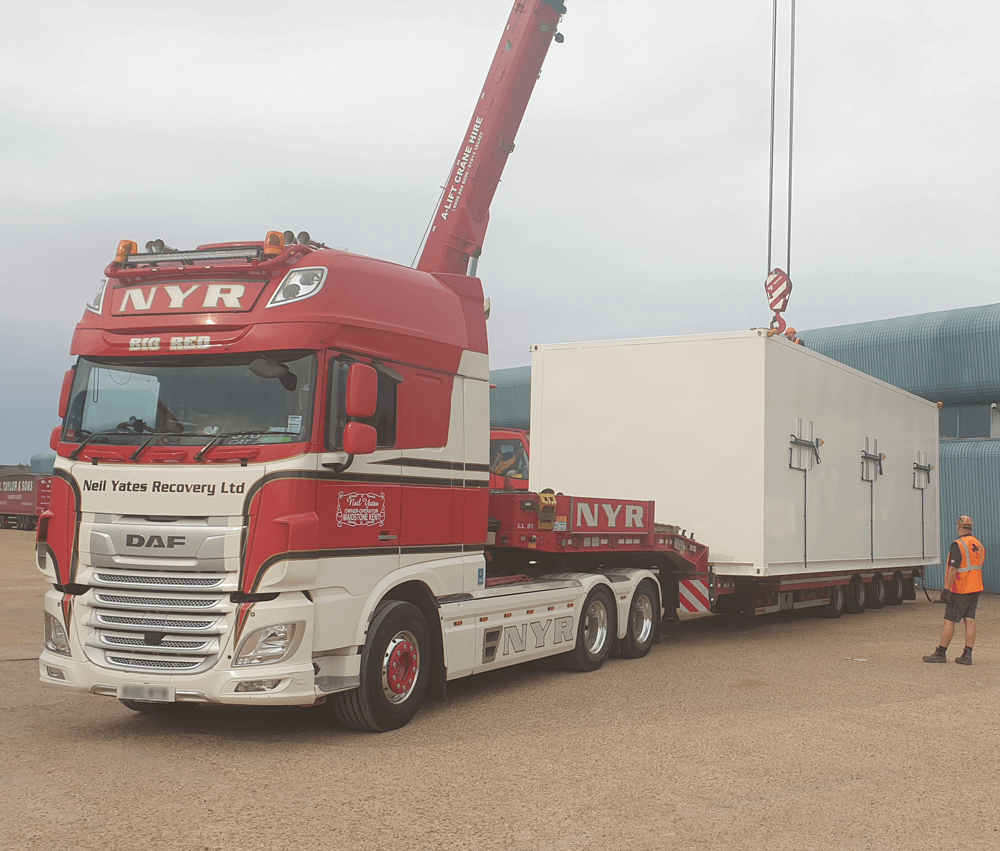

Highly flexible and portable, mobile SCIFs ensure classified data remains protected even during missions in remote or high-risk locations.
Pros:
- Fastest time‑to‑operate; delivered plug‑in‑ready; can be moved between locations as missions change.
- Enables secure operations at the edge with portability; supports accreditation targets when built to SCIF guidelines and field‑ready fit‑outs.
Cons:
- Smaller working areas versus fixed rooms; mission duration may be constrained by site power, comms and environmental conditions.
- May require more planning for environmental hardening and connectivity than fixed facilities, depending on theater conditions.
Explore APC's Range of Comprehensive SCIF Solutions
Ask a Member of our Expert Team
Have more questions regarding SCIFs, or need advice and support for planning your own Secure Compartmented Information Facility? Our team are on hand to answer your questions and share the technical insight we have to ensure you meet your project requirements.
Request a callback from a member of our technical team to get dedicated one-to-one consultancy for your SCIF requirements.
Your Certified Partner for Secure, Compliant SCIF Projects
With 40+ years’ experience, APC Technology Group supplies genuine, traceable MIL-STD components and systems for Naval, Land, and Avionic applications. As a distributor for 100+ specialist manufacturers, we deliver secure, high-reliability solutions and are backed by BS EN 9120, ISO 9001, Cyber Essentials Plus, AS9120 and ADS Group accredited, ensuring trusted quality and compliance for mission-critical projects.
